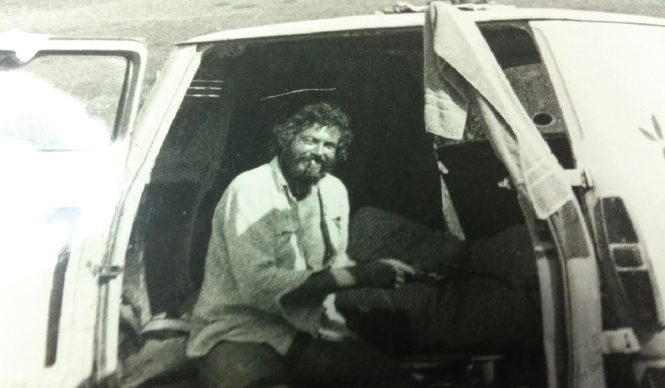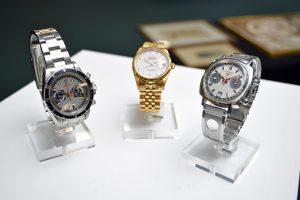
DURING the 1970s, Stephen Bentley, a 29-year-old detective, went undercover as Steve Jackson, spending his time as part of a gang making and distributing LSD.
He has now released his shocking story, outlining his time within the West Wales cartel. Within ‘Undercover Operation Julie – The Inside Story’, Mr Bentley tells his story of how he helped to bring down two criminal networks during his time in the field, and how his undercover persona as a cannabis-smoking hippy ultimately became his demise.
With origins in counter-culture, the drugs ring that Bentley helped to infiltrate over a period of two years involved doctors, scientists and university graduates.
Recruited in 1969, Liverpool University chemist Richard Kemp was employed by Cambridge author David Solomon to manufacture LSD, initially as part of a social experiment in a bid for world peace through ‘mind-expansion’.
Henry Todd, a London-based businessman, was then employed in order to handle sales. However, by 1973, the group had fallen out, prompting Kemp and Solomon to move production from Cambridge to West Wales.
In 1975, evidence of hydrazine hydrate, a key ingredient in the manufacture of LSD, was found in a Range Rover belonging to Kemp by the police after it was involved in a fatal crash near Machynlleth, West Wales.
Police then begun to set up a drugs operation, run in secret by Operation Commander Dick Lee, as a precaution against corruption in the Metropolitan Police and provincial police stations.
Mr Bentley was hand-selected for the potentially dangerous role of undercover detective by Commander Lee.
Commander Lee regarded Bentley as a ‘talented, friendly and intelligent detective’.
There was no training manual for infiltrating a drugs cartel and Mr Bentley now recalls that his first operation required him to watch Plas Llysyn, a mansion deep in the heart of central Wales. This was where Kemp and his girlfriend, Dr Christine Bott, were suspected of producing LSD.
Although most surveillance was ‘utterly boring’, a decision was made to break into the property, said Mr Bentley.
The break-in provided the team with substantial evidence of an acid factory hidden within the property’s cellar.
Commander Lee issued a new plan in June 1976, which required Mr Bentley, along with Officer Eric Wright, to infiltrate a ‘community of drop-out hippies’ living in the village of Llanddewi Brefi.
Alston Hughes, known as Smiles, was a member of said community; he was later revealed to be a key figure in the distribution of LSD.
Mr Bentley and Mr Wright were given fake IDs and a cover story in order to infiltrate the group. They claimed to be searching for a lost brother who had absconded from court and joined a commune in Wales.
The two officers stopped shaving and cutting their hair and lived in the back of a transit van with an array of psychedelic flowers painted on the side.
“I had a job to do but I was getting good money and living a carefree life,” said Mr Bentley. “I was able to throw off the shackles of being Stephen Bentley and become a completely different person, with a different outlook on life, different standards, and different scenery.
“The freedom in itself was a high. It was exhilarating.
“Who was Steve Jackson? He was really me in a live stage play, but instead of being in the West End, it was real life.”
This level of freedom was not without cost as the constant fear of being found out left the duo with a ‘constant, unrelenting awareness’ as they feared not only their own personal safety but also the risk of the whole operation.
Both officers had virtually no contact with their families during the operation.
“My cover of being a used car dealer enabled me to get home to my wife for a day or two every so often but I was forced to hide indoors. People would have asked too many questions about the radical change in my appearance,” said Mr Bentley.
When it comes to what attributes are needed to be a successful undercover officer, Mr Bentley was quite clear.
“The first quality is to be likeable. That breaks down most suspicions. I don’t think many people believe a police officer is capable of being a genuinely nice guy while the second is to be prepared to be reckless and take ‘them’ by surprise,” said Mr Bentley.
In order to fit in within the commune as Steve Jackson, Mr Bentley had to adapt to his surroundings – this included taking drugs.
“The over-riding feeling was fear. I was worried about smoking dope and taking cocaine, but those fears subsided as I took more and didn’t end up in the gutter,” he said.
He also had to resort to heavy drinking in order to keep up with the gang.
“I was drinking for England. It was a minimum of five or six pints a day and three or four shots. On a heavy day, it would be 12 to 15 pints and who knows how much whisky.
The two officers’ main aim was to build up a level of trust and socialise with members of the hippy community. They offered their services clearing trees and putting their van to use in order to move people’s furniture.
During one comical occasion, an upright piano went flying out the back of a van when the gang attempted furniture removal after drinking and smoking cannabis.
The local police were unaware of the operation and on another occasion, Mr Bentley enhanced his cover by directing drunken abuse against a village constable.
The truncheon-wielding PC chased the hippies from the pub, although as Mr Bentley recalls, the officer’s ‘athleticism had long gone’, so they were able to out run him.
By then, Mr Bentley was so assimilated into the group that they gave him the nickname ‘cop killer’ – because of his abuse towards the officer.
Mr Bentley built up a ‘perfect’ friendship with Smiles over the years; however, this friendship almost undermined the whole operation.
“Really, when I look back, I wonder how I kept it together,” he said. “There was one occasion that stands out.
“I was sat cross-legged with Smiles in his living room. Through smoking cannabis and drinking I came very, very close to losing self-control and confiding in him who I was, mainly because I really liked him. It was just sheer willpower that stopped me.”
During his undercover assignment, Mr Bentley continued his friendship with Smiles. He said: “I was relieved not to be involved in his arrest, but I went to see him in the police cells at Swindon.
“I’d shaved off the beard. When he recognised me, he just said, ‘no hard feelings’. I felt very emotional. Close to tears. He felt like a brother.”
The pair of undercover officers were pulled out from the ring in February 1977 when all the evidence necessary to arrest the gang was gathered.
Raids were carried out on 87 addresses in Wales, London, Cambridge and France between March and December 1977, eventually turning up laboratory equipment, more than £1m in cash and shares, and enough LSD for 6.5 million doses.
Although Mr Bentley was awarded a promotion for his efforts, be become alcohol-dependent and continued to smoke cannabis, causing his second marriage to break down.
“I was treated so badly that it still rankles now,” he said. “I was a good copper and enjoyed the camaraderie of being part of a crack detective team. I loved the job and resigned while suffering from severe depression.
“My drug habits would never have happened without my exposure on Op Julie.”
While Operation Julie was deemed a success – a total of 120 arrests were made, resulting in 15 convictions and prison sentences totalling more than 120 years – Mr Bentley thinks the long term impact was ‘negligible’.
“The surveillance and undercover techniques honed during the operation were lost,” said Mr Bentley. “Infiltration is highly specialised and should have become a career option to avoid the transition back to normal policing.
“Op Julie was special because it surmounted this parochialism and proved what could be achieved by a de facto national squad.
“The establishment didn’t want to know.”


















Add Comment